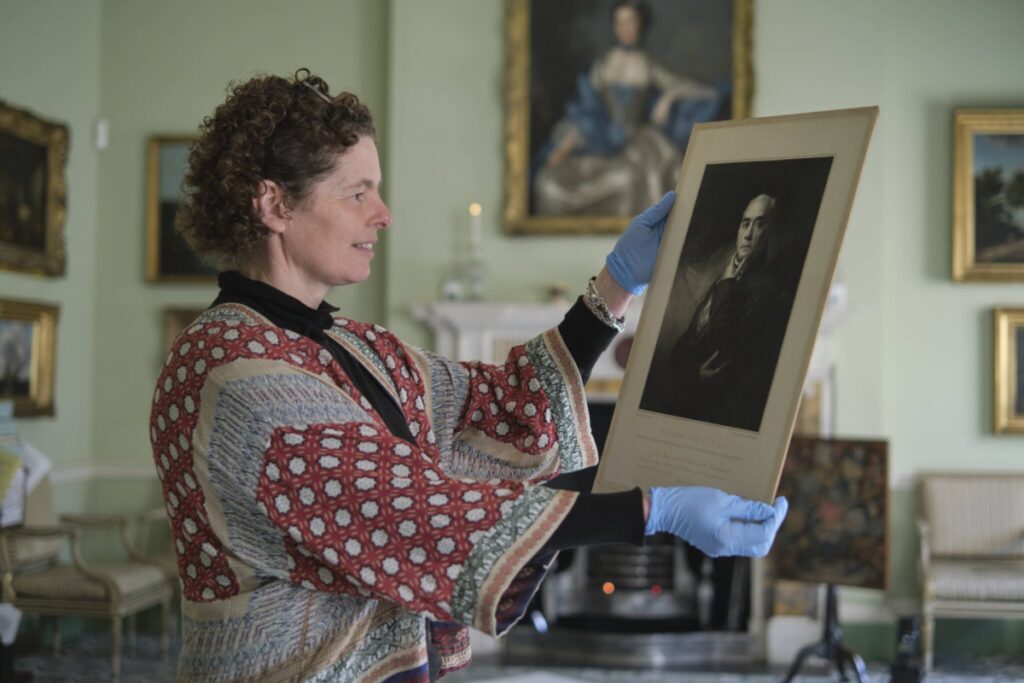A SCOTTISH exhibit is set to open at the National Trust’s Georgian House in Edinburgh to showcase Henry Raeburn’s portraits.
This will give art-lovers a new perfectives about the Scots artistic legends’ career, his subjects’ experiences of sitting for portraits, and life in Enlightenment Scotland.
The Raeburn’s Edinburgh exhibition brings together 18 carefully-selected portraits and engravings, including a self-portrait, from across six National Trust for Scotland properties for the first time.

It tells stories of the artist, the people who sat for him, and the society and attitudes of the city they inhabited.
In parallel, a programme of events and interpretation organised by the conservation charity will illuminate different aspects of Raeburn’s Edinburgh, covering topics from print culture and maps, to historic links to the Caribbean and how visitors can research their own Scottish family history (perhaps finding a link to someone Raeburn painted).
Family events include paper-cutting and collage workshops for children aged six and upwards.
Curating the exhibition is Dr Antonia Laurence-Allen, National Trust for Scotland’s Curator (Edinburgh & East), who said: “Many people are familiar with Raeburn’s work, through portraits such as The Skating Minister – or, to use its official title, Reverend Robert Walker (1755-1808) Skating on Duddingston Loch – on show in the Scottish National Gallery.
“But there’s so much more to Raeburn and his world. Using our charity’s Raeburn collection, we’ve created an intimate and inspiring visitor experience which aims to offer insights into the privileged and enlightened world he moved in.
“Raeburn was very much a man of the moment, during one of the capital’s most vibrant periods, painting everyone from advocates to astronomers and aristocrats.
“This is illustrated through the portraits we have chosen for the exhibition, each of which has a unique Edinburgh connection and an individual story about Raeburn, to provide a unique and fascinating picture of the city.
“We look forward to introducing both local visitors and tourists to Raeburn’s Edinburgh, and hope that the stories and histories woven into this exhibition will give them a richer sense of the city’s wonderful heritage and its relevance today.”
One feature of the exhibition, designed to engage visitors of all ages, is a series of audio recordings.
These share the stories and viewpoints of sitters, such as why they commissioned the portrait, how they paid for it, how they chose their outfit, and what they felt about the experience.
The short multi-perspective audio stories give fresh insights into the sitters themselves and the working practices of one of Scotland’s best-known painters.
They also create a vivid mosaic of the time, helping the visitors of the 21st century to imagine, for themselves, the Edinburgh of centuries back.
Also helping them to do this is a map of Edinburgh, dating back to 1821, which covers one wall of the exhibition. This pinpoints key locations in Raeburn’s life, including his studios in the New Town’s George Street and York Place, and Ann Street in Stockbridge, part of a property development scheme he hoped would sort out his financial worries following a bankruptcy.
Visitors can then walk around these locations themselves, as the map is also available in a takeaway leaflet.
The exhibition has also been innovative for its focus on developing staff and volunteer skills. “Our goal has been to increase opportunities for learning as we develop projects like this,” commented National Trust for Scotland conservator for Edinburgh and East, Lesley Scott.
“Employees and volunteers at the Georgian House were invited to take part in workshops on stabilising and cleaning frames, which was necessary for displaying the engraved prints.
“By upskilling our teams, allowing them to understand how materials age and learn methods for preservation, we are investing in future collections care in line with our strategic engagement objectives.“
Adding to the sense of engagement and community around the exhibition, the audio stories of the sitters have been voiced by Georgian House team members, including volunteers.
Dozens of volunteers, and even their family members, have also stepped forward to steward for the exhibition.
Philip Long OBE, Chief Executive of the National Trust for Scotland, added, “Among the 300,000-plus precious objects our conservation charity cares for and shares are remarkable portraits by Raeburn, spread across properties including Alloa Tower, Castle Fraser, Craigievar Castle, Fyvie Castle and Hill of Tarvit, as well as the Georgian House in Edinburgh’s New Town.
It’s exciting to bring them some of them together for the first time, enabling our members, visitors and other supporters to see some of Raeburn’s finest work, and hear different perspectives on it.
“By using creative, inclusive interpretation and activities that connect and engage different audiences with this work, we’re helping to deliver the engagement objectives in the National Trust for Scotland’s 10-year strategy, Nature, Beauty and Heritage for Everyone.
This will provide access and enjoyment for everyone I hope that people of all ages will enjoy seeing and hearing the people, locations, stories, and experiences of Raeburn’s Edinburgh, and I’m very grateful for the support of National Trust for Scotland members, volunteers, donors and visitors.
“This support makes it possible to organise exhibitions like this and to protect, care for and share Scotland’s heritage.”
Raeburn’s Edinburgh opens at the Georgian House, in Edinburgh’s Charlotte Square on 2 June 2023 and runs until 26 November.
The exhibition is included in admission to the Georgian House, which is free for National Trust for Scotland members.
You can find out more about the exhibition, the Georgian House, and how to book for Raeburn’s Edinburgh events at www.nts.org.uk/visit/places/georgian-house.
